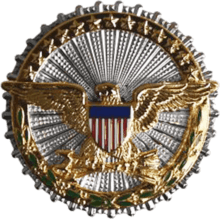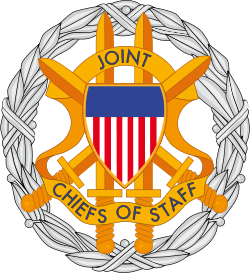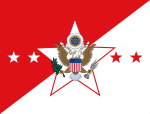Gordon R. Sullivan
| General Gordon R. Sullivan | |
|---|---|
|
Sullivan in November 1992 | |
| Born |
September 25, 1937 Boston, Massachusetts, U.S. |
| Allegiance |
|
| Service/branch |
|
| Years of service | 1959-1995 |
| Rank |
|
| Commands held |
Chief of Staff of the Army Secretary of the Army (Acting) |
| Battles/wars |
Cold War • Vietnam War |
| Awards |
Army Distinguished Service Medal Legion of Merit Bronze Star Medal Purple Heart |
| Other work | President, Association of the U.S. Army |
Gordon Russell Sullivan is a retired United States Army general, who served as the 32nd Chief of Staff of the U.S. Army, as a member of the Joint Chiefs of Staff. General Sullivan also served as Acting Secretary of the Army. After retiring from the Army he served as the President and Chief Executive of the Association of the United States Army (AUSA) for 18 years, from 1998 thru June 30, 2016. He is currently the Chairman of the Board of Trustees of Norwich University, The Army Historical Foundation and also the Marshall Legacy Project.
Early life and education
Sullivan was born September 25, 1937, in Boston, Massachusetts and grew up in nearby Quincy. He was commissioned a second lieutenant of Armor and awarded a Bachelor of Arts degree in history from Norwich University in 1959. He holds a Master of Arts degree in political science from the University of New Hampshire. His professional military education includes the U.S. Army Armor School Basic and Advanced Courses, the Command and General Staff College, and the Army War College.
Career
Sullivan retired from the United States Army on 31 July 1995 after more than 36 years of active service. He culminated his service in uniform as the 32nd Chief of Staff—the senior general officer in the Army—and a member of the Joint Chiefs of Staff. As the Chief of Staff of the Army, he created the vision and led the team that transitioned the Army from its Cold War posture. In August 1993, President Bill Clinton assigned the duties and responsibility of Acting Secretary of the Army to General Sullivan who continued to serve as Chief of Staff.[1]
He is the co-author, with Michael V. Harper, of Hope Is Not a Method (Random House, 1996), which chronicles the enormous challenges encountered in transforming the post-Cold War Army through the lens of proven leadership principles and a commitment to shared values. He currently serves as the Chairman of the Board of Trustees of Norwich University, the Army Historical Foundation, and the Marshall Legacy Institute, as well as a member of the MITRE Army Advisory Board, the MIT Lincoln Labs Advisory Board, and a Life Trustee of the Woods Hole Oceanographic Institute. Sullivan was also the President and Chief Executive Officer of the Association of the United States Army, headquartered in Arlington, Virginia from February 1998 thru June 2016 For his work with AUSA, he was awarded the prestigious Sylvanus Thayer Award by the United States Military Academy in 2003, and the AUSA General George Catlett Marshall Medal, the Association's highest honor, in October 2016.
During his Army career, Sullivan also served as Vice Chief of Staff; Deputy Chief of Staff for Operations and Plans; Commanding General, 1st Infantry Division (Mechanized), Fort Riley, Kansas (June 1988-July 1989); Deputy Commandant, U.S. Army Command and General Staff College, Fort Leavenworth, Kansas (March 1987-June 1988); and Assistant Commandant, U.S. Army Armor School, Fort Knox, Kentucky (November 1983-July 1985). His overseas assignments included four tours in Europe, two in Vietnam and one in Korea.
Personal life
Sullivan was married to Miriam Gay Sullivan (née Loftus) of Quincy, Massachusetts until her death in 2014; he currently resides in Alexandria, Virginia. He has three children and three grandchildren. He is an avid reader and historian.
Awards and decorations
Medals and ribbons
 Combat Infantryman Badge Combat Infantryman Badge |
 Office of the Secretary of Defense Identification Badge Office of the Secretary of Defense Identification Badge |
 Joint Chiefs of Staff Identification Badge Joint Chiefs of Staff Identification Badge |
 Army Staff Identification Badge Army Staff Identification Badge |
| Defense Distinguished Service Medal | |
| Distinguished Service Medal with oak leaf cluster | |
| Defense Superior Service Medal | |
| Legion of Merit | |
| Bronze Star | |
| Purple Heart | |
| Meritorious Service Medal with oak leaf cluster | |
| Joint Service Commendation Medal | |
| Army Commendation Medal with oak leaf cluster | |
| Army Achievement Medal | |
| Meritorious Unit Commendation | |
| National Defense Service Medal with service star | |
| Armed Forces Expeditionary Medal | |
| Vietnam Service Medal with four service stars | |
| Army Service Ribbon | |
| Overseas Service Ribbon with award numeral 4 | |
| Order of Military Merit (Grand Cross) (Brazil) | |
| Officer of the Ordre national du Mérite (France) | |
| Badge of Honour of the Bundeswehr in gold (Germany) | |
| Vietnam Gallantry Cross Unit Citation | |
| Vietnam Campaign Medal |
In fiction
Sullivan appears in the Lee Child book The Enemy, set in January 1990, in which protagonist Jack Reacher believes that the Army Chief of Staff is at the heart of a conspiracy which has left three people dead. Reacher goes to the Pentagon to confront the Chief of Staff. It is revealed that the Chief of Staff has actually been helping Reacher's investigation into the murders by making key personnel changes in Army installations in the United States and elsewhere. Sullivan is mentioned by title only, but the Chief of Staff is described in the books as having come up in the army from the Armored Division. The Chief of Staff also discusses the challenges posed by the end of the Cold War and the resulting restructuring of the Army.
References
- ↑ "Secretary of the Army Accused of Shoplifting", Stephanie Griffith and Bill Miller, The Washington Post, August 28, 1993
External links
- The Sullivan File at the Wayback Machine (archived February 8, 2005), NU webpage.
- TESTIMONY BEFORE THE U.S. HOUSE OF REPRESENTATIVES, COMMITTEE ON ENERGY AND COMMERCE , SUBCOMMITTEE ON ENERGY AND ENVIRONMENT
| Military offices | ||
|---|---|---|
| Preceded by Robert W. RisCassi |
Vice Chief of Staff of the United States Army 1990 – 1991 |
Succeeded by Dennis Reimer |
| Preceded by Carl E. Vuono |
Chief of Staff of the United States Army 1991–1995 |
Succeeded by Dennis J. Reimer |

